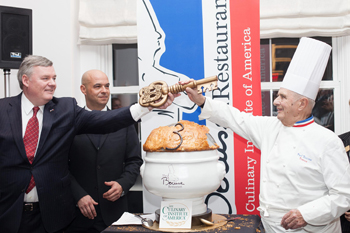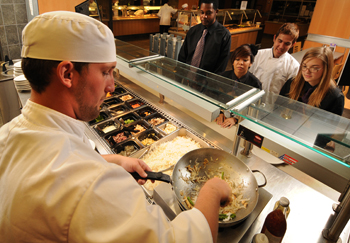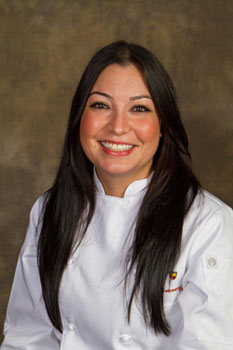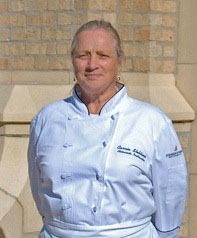CIA Opens The Bocuse Restaurant
 In celebration of The Bocuse Restaurant opening in February at The Culinary Institute of America, Paul Bocuse made a special trip from Lyon, France, for the star-studded inaugural dinner cooked by CIA students.
In celebration of The Bocuse Restaurant opening in February at The Culinary Institute of America, Paul Bocuse made a special trip from Lyon, France, for the star-studded inaugural dinner cooked by CIA students.
Culinary luminaries such as Daniel Boulud, Thomas Keller, Jean-Georges Vongerichten, Charlie Palmer, David Burke, Michel Richard, Jerome Bocuse and the restaurant's namesake, famed Chef Paul Bocuse (named Chef of the Century by the CIA in 2011), gathered at The Culinary Institute of America in Hyde Park, N.Y., on Feb. 15 to celebrate The Bocuse Restaurant’s inaugural dinner. In addition to the restaurant opening, attendees also celebrated Paul Bocuse’s 87th birthday, his decorated career and his incomparable contributions to culinary education throughout his lifetime.

 The U.S. renaissance in charcuterie coupled with diners’ love of sausage makes housemade sausages a customer-satisfying, brand-building notion.
The U.S. renaissance in charcuterie coupled with diners’ love of sausage makes housemade sausages a customer-satisfying, brand-building notion. Good news for graduates this year is that foodservice in healthcare and B&I is projected to expand, says Technomic.
Good news for graduates this year is that foodservice in healthcare and B&I is projected to expand, says Technomic. More popular than chocolate and potato chips, snacking occasions bearing fruit are growing.
More popular than chocolate and potato chips, snacking occasions bearing fruit are growing. Like the many herbs cultivated for healthy, flavorful dishes and cocktails at the new Seasons 52 in West Los Angeles, executive chef and partner Jessica Koine finds a place to grow.
Like the many herbs cultivated for healthy, flavorful dishes and cocktails at the new Seasons 52 in West Los Angeles, executive chef and partner Jessica Koine finds a place to grow. Assigning students to write a white paper can help them focus on an audience, develop an appropriate voice, learn to make a solid case with evidence and conduct careful research.
Assigning students to write a white paper can help them focus on an audience, develop an appropriate voice, learn to make a solid case with evidence and conduct careful research. S
S Rotating groups through learning modules keeps students engaged while enhancing their skills development.
Rotating groups through learning modules keeps students engaged while enhancing their skills development. Coors Recycles® teams up with Recyclebank® to reward consumers for their environmental efforts.
Coors Recycles® teams up with Recyclebank® to reward consumers for their environmental efforts. Highly accomplished chef, restaurateur and author Waldy Malouf has a new mission. After a successful 13-year run as co-owner and chief operating officer of Beacon in New York City, Malouf became the senior director of special projects at The Culinary Institute of America (CIA) in Hyde Park, N.Y., on January 21, 2013.
Highly accomplished chef, restaurateur and author Waldy Malouf has a new mission. After a successful 13-year run as co-owner and chief operating officer of Beacon in New York City, Malouf became the senior director of special projects at The Culinary Institute of America (CIA) in Hyde Park, N.Y., on January 21, 2013.